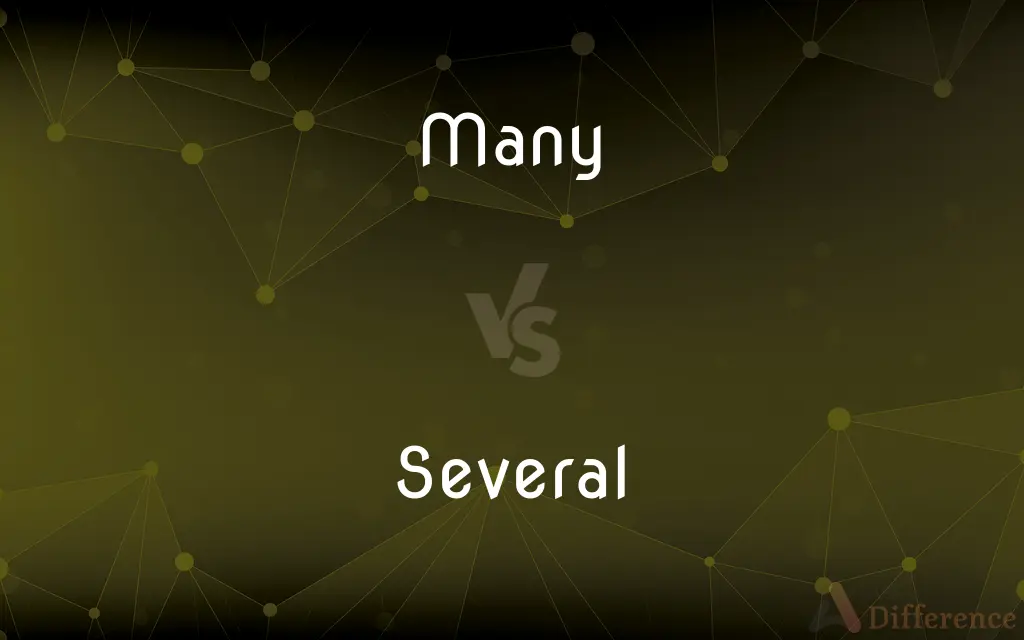Many vs. Several — What's the Difference?
By Tayyaba Rehman — Updated on October 7, 2023
"Many" indicates a large number, often unspecified, while "several" suggests a small number, more than a couple but not exceedingly large.

Difference Between Many and Several
Table of Contents
ADVERTISEMENT
Key Differences
"Many" and "Several" are both quantifiers in the English language, but they hold different nuances in terms of quantity. While "Many" suggests a larger, often unspecified number, "Several" typically refers to a small number, greater than two but not exceedingly large.
Context often dictates the usage of "Many" and "Several." For instance, if you're discussing a vast number of items without specifying an exact count, "Many" would be apt. In contrast, "Several" might be used when the count is not given but is understood to be limited.
When looking at the origin and etymology, both words have old roots in the English language. "Many" comes from the Old English word "manig," meaning numerous. "Several," on the other hand, originates from the Anglo-French word "severals," meaning separate.
Grammatically, both "Many" and "Several" can function similarly, preceding nouns. For instance, "many books" or "several books." However, the connotation of quantity they bring to the sentence is distinct.
In summation, while both "Many" and "Several" provide a sense of quantity, "Many" leans towards a more significant number, whereas "Several" implies a smaller, yet more than a couple, count.
ADVERTISEMENT
Comparison Chart
Indication of Number
Larger, often unspecified number
Small number, more than a couple but not excessively
Usage in Context
When discussing a large quantity
When referring to a limited count
Origin
From Old English "manig" meaning numerous
From Anglo-French "severals" meaning separate
Function
Quantifier
Quantifier
Example Usage
"Many people attended the concert."
"Several people were in the room."
Compare with Definitions
Many
A large number of.
Many students passed the exam.
Several
Comprising a number more than two but not very many.
He has several books on the topic.
Many
Used to emphasize the difference in quantity.
Not as many people as before.
Several
More than two but not many.
Several days passed by.
Many
A greater portion of a total.
Many of the apples were ripe.
Several
Being of a number more than two or three but not many
Several miles away.
Many
Signifying an abundance or plethora.
Many issues arose during the meeting.
Several
Respectively different; various
They parted and went their several ways.
Many
A multitude; a great aggregate.
Many are called, but few are chosen.
Several
(Law) Regarded as separate, especially with regard to tort liability or legal obligation, such that each individual involved is fully responsible for the liability or obligation.
Many
Amounting to or consisting of a large indefinite number
Many friends.
Several
(Archaic) Single; distinct
"Pshaw! said I, with an air of carelessness, three several times" (Laurence Sterne).
Many
Being one of a large indefinite number; numerous
Many a child.
Many another day.
Several
(obsolete) Separate, distinct; particular.
Many
The majority of the people; the masses
"The many fail, the one succeeds" (Tennyson).
Several
A number of different; various.
Many
A large indefinite number
A good many of the workers had the flu.
Several
(law) Separable, capable of being treated separately.
Many
An indefinite large number of.
Not many such people enjoyed playing chess.
There are very many different ways to cook a meal.
Several
Consisting of a number more than two but not very many.
Several cars were in the parking lot.
They had many journals. I subscribed to several.
Several of the members were absent.
Many
(in combinations such as 'as many', 'so many', 'this many') Used to indicate, demonstrate or compare the number of people or things.
We don't need this many bananas. Put some back.
There may be as many as ten million species of insect.
I don't have as many friends as my sister does.
Several
By itself; severally.
Many
An indefinite large number of people or things.
Many are called, but few are chosen.
Several
(obsolete) An area of land in private ownership (as opposed to common land).
Many
A multitude; a great aggregate; a mass of people; the generality; the common herd.
Democracy must balance the rights of the few against the will of the many.
Several
Each particular taken singly; an item; a detail; an individual. en
Many
A considerable number.
Several
(archaic) An enclosed or separate place; enclosure. en
Many
Existing in large number; numerous.
Several
(archaic) A woman's loose outer garment, capable of being worn as a shawl, or in other forms.
Many
A retinue of servants; a household.
Several
Separate; distinct; particular; single.
Each several ship a victory did gain.
Each might his several province well command,Would all but stoop to what they understand.
Many
The populace; the common people; the majority of people, or of a community.
After him the rascal many ran.
Several
Diverse; different; various.
Habits and faculties, several, and to be distinguished.
Four several armies to the field are led.
Many
A large or considerable number.
A many of our bodies shall no doubtFind native graves.
Seeing a great many in rich gowns.
It will be concluded by many that he lived like an honest man.
He is liable to a great many inconveniences.
Several
Consisting of a number more than two, but not very many; divers; sundry; as, several persons were present when the event took place.
Many
Consisting of a great number; numerous; not few.
Thou shalt be a father of many nations.
Not many wise men after the flesh, not many mighty, not many noble, are called.
Several
By itself; severally.
Every kind of thing is laid up several in barns or storehoudses.
Many
A quantifier that can be used with count nouns and is often preceded by `as' or `too' or `so' or `that'; amounting to a large but indefinite number;
Many temptations
The temptations are many
A good many
A great many
Many directions
Take as many apples as you like
Too many clouds to see
Never saw so many people
Several
Each particular taken singly; an item; a detail; an individual.
There was not time enough to hear . . . The severals.
Several
Persons oe objects, more than two, but not very many.
Several of them neither rose from any conspicuous family, nor left any behind them.
Several
An inclosed or separate place; inclosure.
They had their several for heathen nations, their several for the people of their own nation.
Several
Considered individually;
The respective club members
Specialists in their several fields
The various reports all agreed
Several
Distinct and individual;
Three several times
Several
(used with count nouns) of an indefinite number more than 2 or 3 but not many;
Several letters came in the mail
Several people were injured in the accident
Several
An unspecified but limited number.
There are several reasons behind it.
Several
Distinct or different.
There are several variations of the dish.
Several
Various; diverse.
Several of the attendees voiced their opinions.
Common Curiosities
Can "Many" be used for numbers less than ten?
Generally, "Many" implies a larger quantity, but context is crucial.
If I don't know the exact count, should I use "Many" or "Several"?
It depends on your estimation. If you believe it's a larger number, use "Many"; if it's a smaller count, use "Several."
Is "Several" only used for numbers more than two?
Typically, yes. "Several" means more than a couple but not a large number.
Can I use "Several" when referring to only two items or instances?
Typically no, "Several" is used for more than two but not a very large number.
Do "Many" and "Several" mean the same thing?
No, while both indicate quantity, "Many" suggests a larger number and "Several" indicates a small but unspecified number.
Can "Several" be used to mean "Various"?
Yes, "Several" can also imply diversity or variety.
Can "Several" be used for non-countable quantities?
No, "Several" is typically used for countable items or instances.
Can "Several" be used to imply diversity?
Yes, "Several" can indicate a diverse or varied set of items or instances.
Can "Many" be used as a pronoun?
Yes, for example: "Many were invited, but few attended."
Is "Many" always indicative of a majority?
No, "Many" simply denotes a large number, not necessarily a majority.
How does "Many" differ from "Much"?
"Many" is used with countable nouns, while "Much" is used with uncountable nouns.
Is it correct to say "Several dozens"?
While it's grammatically correct, it's redundant. It's more common to say "Several dozen."
Is "A lot of" synonymous with "Many"?
While both indicate a large quantity, "A lot of" can be used with both countable and uncountable nouns, whereas "Many" is primarily for countable nouns.
Does "Many" always suggest a vast number?
Not necessarily. "Many" suggests a larger number, but the context will determine its relative size.
How can I determine when to use "Many" vs. "Several"?
Consider the context and the relative quantity you want to convey. If it's a larger, unspecified number, "Many" is appropriate. If it's a small, unspecified number greater than two, "Several" is apt.
Share Your Discovery

Previous Comparison
Incomplete vs. Uncompleted
Next Comparison
Rollneck vs. TurtleneckAuthor Spotlight
Written by
Tayyaba RehmanTayyaba Rehman is a distinguished writer, currently serving as a primary contributor to askdifference.com. As a researcher in semantics and etymology, Tayyaba's passion for the complexity of languages and their distinctions has found a perfect home on the platform. Tayyaba delves into the intricacies of language, distinguishing between commonly confused words and phrases, thereby providing clarity for readers worldwide.













































